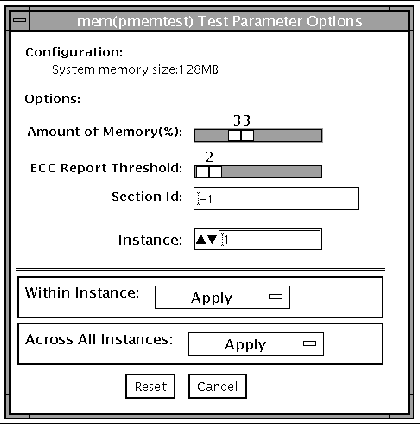Physical Memory Test (pmemtest) |
The
pmemtest
checks the
physical
memory of the system. The
pmemtest
locates
parity errors, hard and soft error correction code (
ECC) errors, memory read errors, and addressing problems. The pseudo driver
mem(7)
is used to read the physical memory.
This test reads through all available physical memory. It does not write to any physical memory location.
pmemtest Options
To reach the dialog box below, right-click on the test name in the System Map and select Test Parameter Options. If you do not see this test in the System Map, you might need to expand the collapsed groups, or your system may not include the device appropriate to this test. Refer to the
SunVTS User's Guide
for more details.
FIGURE 42-1 pmemtest Test Parameter Options Dialog Box

TABLE 42-1 pmemtest Options
|
pmemtest
Options
|
Description
|
|
Configuration
|
Shows the total amount of physical memory, rounded up to the nearest megabyte, probed by the SunVTS kernel.
|
|
Amount of Memory
|
Specifies the percent of the physical memory to be tested. The default is 33%.
|
|
ECC Report Threshold
|
Determines how many correctable ECC errors occurred in the elapsed time before
pmemtest
reports a test failure. A value of zero results in no report of any correctable ECC errors. The default is 2.This option is only available on
UltraSPARC systems.
systems.
|
|
Section ID
|
When set to -1,
pmemtest
will test one memory section in each pass, automatically testing each subsequent memory section as testing progresses. When set to a number other than -1, only the section specified will be tested. A section is defined by the pass and instance number settings. This option is only available on UltraSPARC systems.
|
|
Instance
|
The number of copies of
pmemtest
to run simultaneously on the memory you are testing.
|
pmemtest Test Modes
TABLE 42-2 pmemtest Test Modes
|
Test Mode
|
Supported?
|
Description
|
|
Connection Test
|
Yes
|
In this mode, one percent of the memory is read.
pmemtest
also informs the user how much physical memory is available. For sun4m, sun4u, and UltraSPARC servers, the test reports the ECC errors that have occurred since it was last invoked. The test reports ECC errors for a particular CPU or memory board when physical mapping is selected, otherwise it provides the SIMM number of the ECC memory error.
|
|
Functional
(Offline)
|
Yes
|
In Functional test mode, the amount of memory to be read can vary. For UltraSPARC servers, this test mode reports all ECC errors that have occurred since the system was brought online
|
pmemtest Command-Line Syntax
/opt/SUNWvts/bin/pmemtest
standard_arguments
-o size=
[1-100]
,dev=
device_name
,threshold=
report_threshold
,bdinfo=
number
,section=
section_id
TABLE 42-3 pmemtest Command-Line Syntax
|
Argument
|
Description
|
|
size
=
[1-100]
|
S
pecifies the percentage of memory to be tested. The default is 33%.
|
|
dev=
device_name
|
Specifies the device to test, for example,
mem
.
|
|
threshold=
report_threshold
|
Determines how many correctable ECC errors occur before they are reported as an error causing
pmemtest
to report a failure. A value of zero results in no report of any correctable ECC errors. The default is 2.This option is only available on UltraSPARC systems.
|
|
bdinfo=
number
|
For UltraSPARC servers, indicates board number information. For example, if board 0 and board 5 have memory and you want the test to read the memory on both boards, then bdinfo=33 (2**5+2**0).
|
|
section=
section_id
|
When set to -1,
pmemtest
will test one memory section in each pass, automatically testing each subsequent memory section as testing progresses. When set to a number other than -1, only the section specified will be tested.A section is defined by the pass and instance number settings. This option is only available on UltraSPARC systems.
|
|
Note Note - 64-bit tests are located in the sparcv9 subdirectory: /opt/SUNWvts/bin/sparcv9/testname. If a test is not present in this directory, then it may only be available as a 32-bit test. For more information refer to 32-Bit and 64-Bit Tests.
|
|
SunVTS 5.0 Test Reference Manual
|
816-1667-10
|




|
Copyright
© 2002, Sun Microsystems, Inc. All rights reserved.
